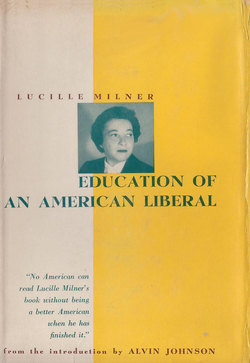Читать книгу Education of an American Liberal - Lucille LLC Milner - Страница 3
На сайте Литреса книга снята с продажи.
Introduction
ОглавлениеLiberty is the breath of life of our American Republic. "Man," said Rousseau, "is everywhere born free, and is everywhere in chains." We Americans were born free. Most of us, by the grace of God, have not experienced the chains.
But so long as there are men stronger by personal power or by circumstance and men that are weaker, there will be chains, unless natural liberty is translated into civil liberty, liberty established by law and defended by the courts that administer the law. The majority of us enjoy civil liberty, for ourselves. The select few among us are ready to make sacrifices, often heavy sacrifices, to defend the civil liberties of others.
Civil liberty as the Founders of the Republic conceived it and wrote it into the Bill of Rights meant that the American citizen was to be free to think his own thoughts; he was to be free to express his thoughts by speech or through the press. Was he to be free to express thoughts abhorrent to the community? Yes, however abhorrent his ideas, the good people had to refute them or take them. This was America. Julius Caesar asserted that it was the fundamental principle of sound law that no man could be held accountable before the law for his opinions, but only for his overt, unlawful acts. The thought of the early American Republic followed this principle.
Down to recent times we have had no organization devoted to the defense of civil liberties. We have had spotty ad hoc organizations in defense of particular individuals, but nothing equivalent to the noble French League for the Defense of the Rights of Man. In essence, the American Civil Liberties Union developed by Roger Baldwin and Lucille Milner has been such an organization of good citizens.
The frightful outrages against civil liberties that attended the first world war led Roger Baldwin, who had worked actively in the American Union Against Militarism, to develop out of the civil liberties committee of that Union a National Civil Liberties Bureau during World War I, the first organization for the defense of civil liberties in all American history. Roger Baldwin, who had been associated in public welfare issues in St. Louis with the author of this book, asked her to join him in the civil liberties work. Lucille Milner accepted, and became secretary of the peacetime American Civil Liberties Union. Thus, she has been on the inside of the Civil Liberties organization from the very beginning in 1920. She gave the best of her life to it, until 1945.
As a good American citizen born free I cherished the American Civil Liberties Union. I admired Roger Baldwin, who was glad to go to jail as a conscientious objector, though his frail figure would not have merited a yard on the firing line. And I early learned to value Lucille Milner in the Civil Liberties setup. She had a level head. You could trust her.
One cannot read Lucille Milner's book without a growing sense that a powerful organization for the defense of civil liberties is an indispensable bulwark of the American way of life. We must not be surprised to see epidemics of persecution conducted by those who happen to be in the seats of power. Such persecutions we had after the first world war and in the early years of the Great Depression, and once again today.
That little body of true Americans who in 1920 organized for the defense of civil liberties seemed to be attempting to sweep back the ocean tide. They made up with courage and will power for what they lacked in the way of political power. A. Mitchell Palmer could swing all the power of the Attorney General's office to crush little people whose ideas and words could be labelled by the new weasel word "subversive," but Palmer's power disintegrated while the Civil Liberties Union grew stronger. After all, the Palmers of that time like the McCarthys of today are intrusions upon the honest traditions of free America; such intrusions are bound to wither away.
Lucille Milner has chosen the form of an autobiography to present her experience in the fight for civil liberties. It is a charming autobiography: the reader would like to see more of Lucille Milner in it; but the little one sees is rewarding. One gets some sense of the forces that made an extremely charming member of the privileged classes secede from the pleasantness of privileged life to hover around the slums, and to court outrage on the picket lines.
What she set out to do, and has done successfully, was to write a case history of the Civil Liberties Union and of the state of civil liberties in America through a succession of crisis periods. She has done a superb job.
No American can read Lucille Milner's book without being a better American when he has finished it.
ALVIN JOHNSON
President Emeritus
New School for Social Research, New York City
